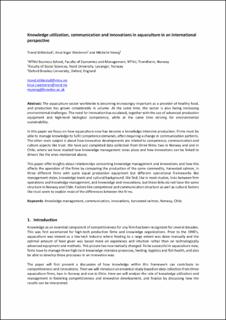Knowledge utilization, communication and innovations in aquaculture in an international perspective
Peer reviewed, Journal article
Accepted version

Åpne
Permanent lenke
https://hdl.handle.net/11250/2650901Utgivelsesdato
2019Metadata
Vis full innførselSamlinger
- NTNU Handelshøyskolen [1623]
- Publikasjoner fra CRIStin - NTNU [37957]
Originalversjon
Proceedings of the International Conference on Intellectual Capital, Knowledge Management and Organisational Learning, ICICKM. 2019, 1 322-330. 10.34190/IKM.19.077Sammendrag
The aquaculture sector worldwide is becoming increasingly important as a provider of healthy food, and production has grown considerably in volume. At the same time, the sector is also facing increasing environmental challenges. The need for innovation has escalated, together with the use of advanced production equipment and high-level biological competence, while at the same time striving for environmental sustainability.
In this paper we focus on how aquaculture now has become a knowledge intensive production. Firms must be able to manage knowledge to fulfil competence demands, often requiring a change in communication patterns. The other main subject is about how innovative developments are related to competence, communication and culture aspects like trust. We have just completed data collection from three firms: two in Norway and one in Chile, where we have studied how knowledge management takes place and how innovations can be linked to drivers like the ones mentioned above.
This paper offer insights about relationships concerning knowledge management and innovations and how this affects the operation of the firms by comparing the production of the same commodity, harvested salmon, in three different firms with quite equal production equipment but different operational frameworks like management styles, knowledge levels and cultural background. We find, like in most studies, links between firm operations and knowledge management, and knowledge and innovations, but these links do not have the same structure in Norway and Chile. Factors like competence and communication structure as well as cultural factors like trust seem to explain most of the differences between the firms.